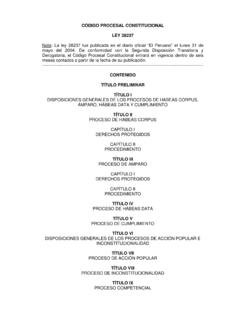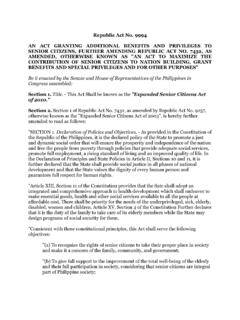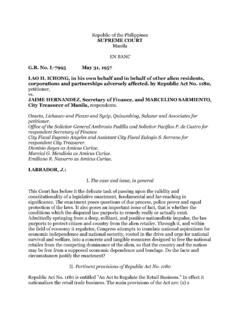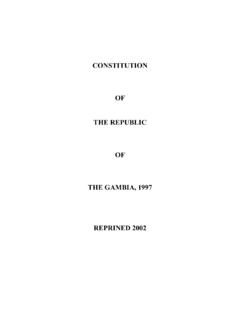Transcription of REPUBLIC ACT NO. 7277 AN ACT PROVIDING FOR THE ...
1 REPUBLIC ACT NO. 7277 . AN ACT PROVIDING FOR THE REHABILITATION, self -DEVELOPMENT AND self - reliance OF DISABLED PERSONS AND THEIR INTEGRATION INTO THE MAINSTREAM OF SOCIETY AND FOR OTHER PURPOSES. TITLE I GENERAL PROVISIONS CHAPTER I BASIC PRINCIPLE Section 1. Title. This Act shall be known and cited as the "Magna Carta for Disabled Persons." Sec. 2. Declaration of Policy The grant of the rights and privileges for disabled persons shall be guided by the following principles: (a) Disabled persons are part of Philippine society, thus the State shall give full support to the improvement of the total well-being of disabled persons and their integration into the mainstream of society.
2 Toward this end, the State shall adopt policies ensuring the rehabilitation, self -development and self - reliance of disabled persons. It shall develop their skills and potentials to enable them to compete favorably for available opportunities. (b) Disabled persons have the same rights as other people to take their proper place in society. They should be able to live freely and as independently as possible. This must be the concern of everyone the family, community and all government and nongovernment organizations. Disabled persons' rights must never be perceived as welfare services by the Government. (c) The rehabilitation of the disabled persons shall be the concern of the Government in order to foster their capacity to attain a more meaningful, productive and satisfying life.
3 To reach out to a greater number of disabled persons, the rehabilitation services and benefits shall be expanded beyond the traditional urban-based centers to community based programs, that will ensure full participation of different sectors as supported by national and local government agencies. (d) The State also recognizes the role of the private sector in promoting the welfare of disabled persons and shall encourage partnership in programs that address their needs and concerns. (e) To facilitate integration of disabled persons into the mainstream of society, the State shall advocate for and encourage respect for disabled persons.
4 The State shall exert all efforts to remove all social, cultural, economic, environmental and attitudinal barriers that are prejudicial to disabled persons. Sec. 3. Coverage. This Act shall cover all disabled persons and, to the extent herein provided, departments, offices and agencies of the National Government or nongovernment organizations involved in the attainment of the objectives of this Act. Sec. 4. Definition of Terms. For purposes of this Act, these terms are defined as follows: (a) Disabled persons are those suffering from restriction or different abilities, as a result of a mental, physical or sensory impairment, to perform an activity in the manner or within the range considered normal for a human being; (b) Impairment is any loss, diminution or aberration of psychological, physiological, or anatomical structure or function; (c) Disability shall mean 1) a physical or mental impairment that substantially limits one or more psychological, physiological or anatomical function of an individual or activities of such individual.
5 2) a record of such an impairment; or 3) being regarded as having such an impairment; (d) Handicap refers to a disadvantage for a given individual, resulting from an impairment or a disability, that limits or prevents the function or activity, that is considered normal given the age and sex of the individual; (e) Rehabilitation is an integrated approach to physical, social, cultural, spiritual, educational and vocational measures that create conditions for the individual to attain the highest possible level of functional ability; (f) Social Barriers refer to the characteristics of institutions, whether legal, economic, cultural, recreational or other, any human group, community, or society which limit the fullest possible participation of disabled persons in the life of the group.
6 Social barriers include negative attitudes which tend to single out and exclude disabled persons and which distort roles and inter-personal relationships; (g) Auxiliary Aids and Services include: (1) qualified interpreters or other effective methods of delivering materials to individuals with hearing impairments; (2) qualified readers, taped tests, or other effective methods of delivering materials to individuals with visual impairments; (3) acquisition or modification of equipment or devices; and (4) other similar services and actions or all types of aids and services that facilitate the learning process of people with mental disability.
7 (h) Reasonable Accommodation include 1) improvement of existing facilities used by employees in order to render these readily accessible to and usable by disabled persons; and 2) modification of work schedules, reassignment to a vacant position, acquisition or modification of equipment or devices, appropriate adjustments or modifications of examinations, training materials or company policies, rules and regulations, the provision of auxiliary aids and services, and other similar accommodations for disabled persons; (i) Sheltered Employment refers to the provision of productive work for disabled persons through workshops PROVIDING special facilities, income-producing projects or homework schemes with a view to giving them the opportunity to earn a living thus enabling them to acquire a working capacity required in open industry; (j) Auxiliary Social Services are the supportive activities in the delivery of social services to the marginalized sectors of society.
8 (k) Marginalized Disabled Persons refer to disabled persons who lack access to rehabilitative services and opportunities to be able to participate fully in socioeconomic activities and who have no means of livelihood and whose incomes fall below the poverty threshold; (l) Qualified Individual with a Disability shall mean an individual with a disability who, with or without reasonable accommodations, can perform the essential functions of the employment position that such individual holds or desires. However, consideration shall be given to the employer's judgment as to what functions of a job are essential, and if an employer has prepared a written description before advertising or interviewing applicants for the job, this description shall be considered evidence of the essential functions of the job; (m) Readily Achievable means a goal can be easily attained and carried out without much difficulty or expense.
9 In determining whether an action is readily achievable, factors to be considered include (1) the nature and cost of the action; (2) the overall financial resources of the facility or facilities involved in the action; the number of persons employed at such facility; the effect on expenses and resources, or the impact otherwise of such action upon the operation of the facility; (3) the overall financial resources of the covered entity with respect to the number of its employees; the number, type and location of its facilities; and (4) the type of operation or operations of the covered entity, including the composition, structure and functions of the work force of such entity; the geographic separateness, administrative or fiscal relationship of the facility or facilities in question to the covered entity.
10 (n) Public Transportation means transportation by air, land and sea that provides the public with general or special service on a regular and continuing basis; (o) Covered Entity means an employer, employment agency, labor organization or joint-labor management committee; and (p) Commerce shall be taken to mean as travel, trade, traffic, commerce, transportation, or communication among the provinces or between any foreign country or any territory or possession and any province. TITLE II RIGHTS AND PRIVILEGES OF DISABLED PERSONS CHAPTER I EMPLOYMENT Sec. 5. Equal Opportunity for Employment. No disable person shall be denied access to opportunities for suitable employment.

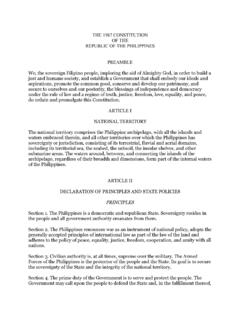
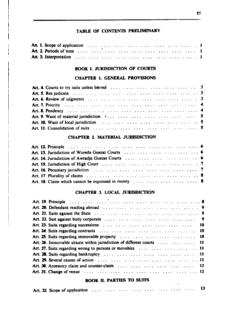

![Cap. 23] CHILDREN AND YOUNG PERSONS](/cache/preview/a/e/5/4/4/e/e/6/thumb-ae544ee647db019dff09ed2c401367af.jpg)
